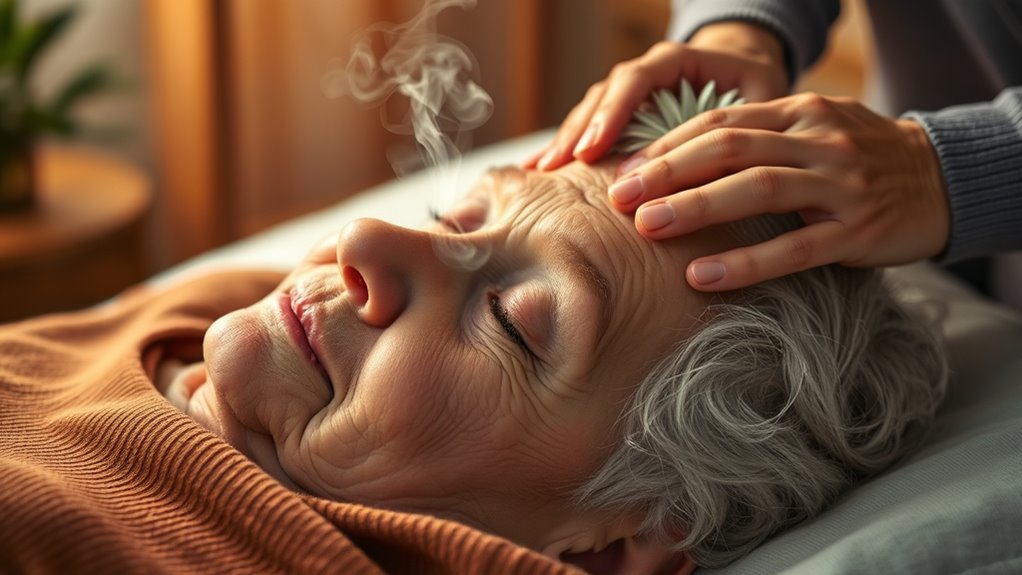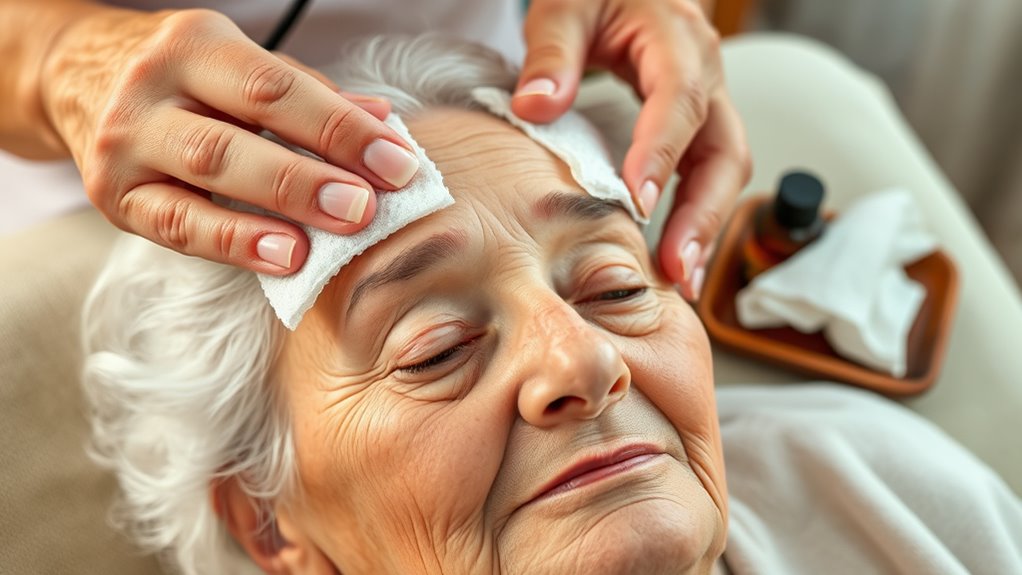Aromatic compresses can offer comfort and relaxation for someone with advanced Alzheimer’s by using warm or cool cloths infused with calming essential oils like lavender or peppermint. You apply these compresses gently to areas like the forehead or hands, ensuring they are at a safe temperature. This gentle touch combined with soothing scents helps reduce agitation and physical discomfort. If you keep exploring, you’ll discover ways to incorporate these techniques safely and effectively into daily care.
Key Takeaways
- Aromatic compresses promote relaxation and reduce agitation in advanced Alzheimer’s by soothing senses with warm or cool infused cloths.
- Using essential oils like lavender and peppermint enhances calming effects and can be safely incorporated into routine care.
- Proper application involves testing for allergies, maintaining safe temperature, and avoiding sensitive areas like eyes or wounds.
- Regular use at consistent times creates familiarity, helping to improve emotional well-being and reduce anxiety.
- Precautions include patch testing, high-quality oils, and consulting healthcare professionals to ensure safety and effectiveness.
Understanding Aromatic Compresses and Their Role in Care

Aromatic compresses are simple yet effective tools used to promote relaxation and soothe discomfort. When you apply a warm or cool cloth infused with aromatic elements, you create a calming experience that can ease physical tension or pain. These compresses work by stimulating your senses and encouraging relaxation, which is especially beneficial for individuals with advanced Alzheimer’s who may struggle with agitation or discomfort. The gentle pressure and aroma help ground individuals in the present moment, reducing anxiety and promoting a sense of calm. You can customize the compress with different textures or temperatures to target specific needs. Incorporating sensory therapy like aromatic compresses can complement traditional care approaches and enhance overall well-being. Understanding Alzheimer’s care strategies can also inform how best to utilize such calming techniques. Additionally, selecting the appropriate aromatic elements can amplify their effectiveness in soothing and grounding individuals. Utilizing aromatherapy principles can further optimize the benefits of aromatic compresses for comfort. Overall, aromatic compresses serve as a supportive, non-invasive method to enhance comfort and emotional well-being during care.
Essential Oils Commonly Used for Comfort and Relaxation

Lavender is a popular choice for comfort thanks to its soothing scent and calming effects. Peppermint, on the other hand, offers an invigorating, cooling sensation that helps reduce tension. Both oils are widely used to promote relaxation and ease discomfort during aromatic compresses. Incorporating these essential oils into your routine can enhance the therapeutic benefits and provide a sense of tranquility. Additionally, integrating aromatic therapy techniques like those hosted virtually can facilitate access to expert advice on personalized aromatherapy treatments, improving overall outcomes.
Soothing Lavender Benefits
Because of its calming properties, lavender essential oil is widely used to promote relaxation and reduce stress. Its soothing aroma can help ease anxiety and improve sleep quality, making it ideal for individuals with advanced Alzheimer’s. Lavender’s gentle scent also provides comfort during difficult moments, creating a sense of calm. Here’s a quick overview of its benefits:
| Benefit | How It Helps |
|---|---|
| Stress reduction | Eases anxiety and agitation |
| Improved sleep | Promotes restful, uninterrupted sleep |
| Mood enhancement | Creates feelings of tranquility |
Lavender’s versatility makes it a staple in aromatherapy, especially for comfort-focused applications. Its natural, calming effects support emotional well-being and help create a peaceful environment.
Calming Peppermint Properties
Peppermint essential oil is well known for its calming and invigorating properties, making it a popular choice for promoting relaxation and comfort. Its crisp, minty aroma can help reduce feelings of stress and anxiety, creating a soothing environment. When used in compresses, peppermint oil can help ease tension, calm restless minds, and promote a sense of clarity. The cooling sensation from the oil also offers a gentle relief from discomfort, making it especially beneficial for individuals with advanced Alzheimer’s. You might find that inhaling peppermint’s scent helps improve mood and focus, offering a moment of respite amidst confusion or agitation. Incorporating peppermint into aromatic compresses can provide a revitalizing, calming experience that supports relaxation and overall well-being.
Preparing and Applying Aromatic Compresses Safely

To guarantee safety when preparing and applying aromatic compresses, it’s vital to follow proper guidelines from start to finish. Begin by choosing high-quality, pure essential oils suitable for topical use. Always dilute the oils with a carrier oil, such as almond or coconut oil, to prevent skin irritation. Test a small patch on the skin first to check for allergic reactions. When applying the compress, make certain it’s at a comfortable temperature—not too hot or cold. Keep the compress covered with a clean cloth or towel to prevent spills. Never apply essential oils directly to the skin without dilution, and avoid sensitive areas like the eyes or mucous membranes. After use, wash your hands thoroughly and monitor for any adverse reactions. Additionally, awareness of the history of pinball machines can be useful for understanding the cultural context of recreational activities.
Benefits of Aromatic Compresses for Individuals With Advanced Alzheimer’S

Aromatic compresses can offer meaningful comfort to individuals with advanced Alzheimer’s by helping to reduce agitation and promote relaxation. The soothing scents, like lavender or chamomile, can calm restless feelings and create a sense of safety. When applied, these compresses may also help ease physical discomfort, such as muscle tension or headaches, which can worsen agitation. The calming aroma can trigger positive memories or associations, providing a gentle mental break from confusion or distress. Regular use can enhance overall well-being, making daily routines less stressful. Because aromatherapy is non-invasive, it offers a gentle way to support emotional and physical comfort. This natural approach can improve quality of life and help caregivers foster a more peaceful environment for their loved ones.
Tips for Incorporating Aromatic Compresses Into Daily Routines

To incorporate aromatic compresses into your daily routine, start by selecting soothing aromas that promote relaxation. It’s helpful to establish a consistent timing, like mornings or evenings, to create a calming habit. Always guarantee safe application by following proper guidelines and checking for any sensitivities.
Select Soothing Aromas
Incorporating soothing aromas into your daily routine can be simple and highly effective. Start by choosing scents that evoke calm and comfort. Lavender is known for its relaxing properties, helping reduce anxiety and promote sleep. Chamomile offers gentle reassurance and a sense of peace, ideal for moments of stress. Citrus, like orange or lemon, can uplift mood and provide a fresh, clean feeling. When selecting aromas, consider your loved one’s preferences and responses. Visualize these scents filling the air or wrapping around them like a comforting hug.
- Soft lavender drifting through the air during quiet moments
- Warm chamomile scent during times of agitation
- Bright citrus aroma to energize and uplift spirits
Establish Routine Timing
Establishing consistent timing for your aromatic compresses guarantees they become a helpful part of your daily routine. Pick specific times, like morning or evening, to create a sense of familiarity and comfort. Consistency helps your loved one anticipate and associate the compress with relaxation. To make this easier, consider a schedule:
| Time of Day | Activity | Aromatic Choice |
|---|---|---|
| Morning | Breakfast | Lavender |
| Afternoon | Rest | Chamomile |
| Evening | Bedtime | Bergamot |
| Midday | Break | Peppermint |
Following this schedule ensures the compress becomes a comforting ritual, helping reduce anxiety and agitation. Adjust the times as needed to fit your loved one’s daily rhythm, making relaxation a natural part of each day.
Ensure Safe Application
Ensuring safe application of aromatic compresses is essential for your loved one’s well-being. Always check the essential oils for skin sensitivity by doing a patch test first. Use only high-quality, pure oils, and avoid those that may cause irritation. Keep the compress at a comfortable temperature, never too hot or cold, to prevent burns or discomfort. When applying, gently place the compress on the skin, avoiding sensitive areas like the eyes or open wounds.
Imagine a soft cloth warmed just enough to soothe, a gentle touch on the forehead or hands, and a calming aroma filling the room. This mindful approach guarantees safety while providing comfort, making aromatherapy a safe and effective routine.
Precautions and Considerations for Caregivers

While aromatherapy can offer soothing relief, caregivers must exercise caution to avoid adverse reactions. Always test a small amount of essential oil on the skin first to check for allergies or sensitivities. Use only high-quality, pure oils specifically meant for aromatherapy. Be mindful of the scent’s strength; overpowering aromas can cause confusion or discomfort in someone with Alzheimer’s. Avoid applying compresses near the face or on sensitive skin areas. Keep essential oils out of reach of your loved one to prevent accidental ingestion. If you notice any adverse effects like skin irritation, respiratory issues, or increased agitation, stop use immediately and consult a healthcare professional. Remember, aromatherapy should complement other care strategies, not replace medical advice or treatment. Familiarity with essential oils can help caregivers choose the safest options for their loved ones. Additionally, understanding aroma sensitivities in Alzheimer’s patients can help prevent overstimulation or agitation. Being aware of air quality factors, such as the presence of air purifiers, can further enhance a safe and calming environment. Moreover, staying informed about advances in AI in education can support caregivers in accessing innovative tools for training and support.
Frequently Asked Questions
Can Aromatic Compresses Be Used Alongside Other Alzheimer’s Treatments?
You can use aromatic compresses alongside other Alzheimer’s treatments, but it’s important to consult your healthcare provider first. These compresses can complement medication and therapy by providing calming effects and reducing anxiety. Since everyone’s condition is different, your doctor can advise you on safe combinations and guarantee that aromatherapy doesn’t interfere with existing treatments. Always follow professional guidance to maintain safety and maximize comfort for your loved one.
How Long Does Each Aromatic Compress Session Typically Last?
Think of a typical aromatic compress session as a gentle breeze—lasting just enough to soothe without overstaying its welcome. Usually, each session lasts about 10 to 15 minutes, giving your loved one time to relax and absorb the calming scents. You can adjust the duration based on their comfort level and response. Always observe their reactions and stop if they seem distressed or uncomfortable.
Are There Any Age-Specific Considerations for Elderly Users?
When considering age-specific factors, you should be mindful of the elderly’s sensitive skin and potential allergies. Always test the compress on a small skin area first, and use gentle, diluted essential oils. Keep sessions brief to avoid overstimulation, and monitor for any adverse reactions. It’s best to consult with a healthcare professional before starting, ensuring the aromatherapy approach aligns with their health conditions and medications.
What Signs Indicate a Negative Reaction to Aromatic Compresses?
You might think reactions are obvious, but sometimes a negative one sneaks up on you. Watch for signs like increased agitation, redness, swelling, or skin irritation, which indicate discomfort. If your loved one suddenly becomes more confused or shows signs of breathing difficulties, take it seriously. Ironically, what’s meant to soothe can sometimes cause distress, so always monitor closely and discontinue use if any adverse reactions appear.
Can Aromatic Compresses Be Customized for Individual Preferences?
Yes, you can customize aromatic compresses to suit individual preferences. You should consider the person’s favorite scents or those known to evoke comfort and relaxation. Use essential oils in small amounts and test for sensitivities before applying. Adjust the aroma strength based on their response, and choose calming scents like lavender or chamomile. Personalizing the compress helps enhance comfort and makes the experience more soothing for the individual.
Conclusion
Incorporating aromatic compresses into your loved one’s routine is like wrapping them in a gentle, soothing embrace that eases their mind and comforts their body. With the calming scent guiding them like a lighthouse through foggy waters, you create a haven of peace amid chaos. Trust in these small, fragrant gestures to bring light and serenity into their world, turning everyday moments into tender islands of relief and connection.









